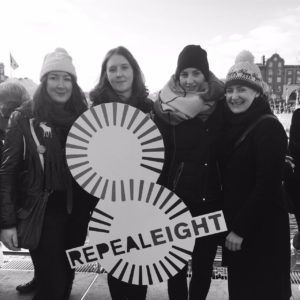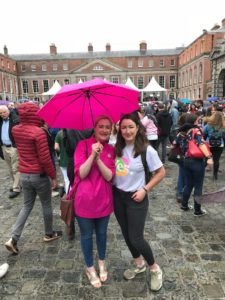Here's what we learned from the abortion referendum campaign
This date two months ago, I was sitting outside the Ivy – a pub across from Dublin Castle – having a beer with Emily and other friends to celebrate the resounding victory for the ‘yes’ side in the abortion referendum vote.
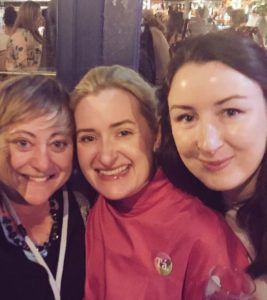 The political journalist Miriam Lord (in my opinion, one of Ireland’s finest newspaper columnists) was sipping a beer beside us. Health Minister Simon Harris was getting swamped for selfies inside the pub. Fianna Fáil leader Micheál Martin strolled past, en route from Dublin Castle.
The political journalist Miriam Lord (in my opinion, one of Ireland’s finest newspaper columnists) was sipping a beer beside us. Health Minister Simon Harris was getting swamped for selfies inside the pub. Fianna Fáil leader Micheál Martin strolled past, en route from Dublin Castle.
Press photographers, journalists and politicians milled about in jubilant mood.
For me – and all at #TeamAlice – this was the culmination of two years’ work on the referendum campaign.
We began working with the Coalition to Repeal the Eighth Amendment in July 2016. We provided social media support and training, and helped publicise Coalition events.
On a cold winter’s day in November 2016, we abandoned our desks for a lunchtime rally on the Rosie Hackett Bridge.
The following April, at the Grand Hotel in Malahide, we hastily pulled together a press conference to welcome the Citizens’ Assembly’s endorsement for reform of Ireland’s abortion law.
Last November, we managed the launch of Everyday Stories, a storytelling and illustration project, highlighting the impact of the Eighth Amendment through personal testimonies.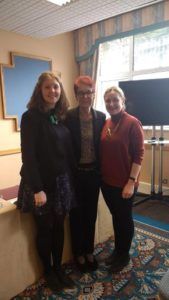
In spring of this year, when the Coalition joined forces with the National Women’s Council and the Abortion Rights Campaign, we managed the launch event for Together for Yes, the national civil society movement spearheaded by these three organisations.
Along the way, we issued dozens of press releases, organised multiple photocalls, and fielded queries from journalists far and wide.
Lessons
At this stage, countless articles have been written on lessons from the referendum campaign.
Much has been said (and remains to be said – and permanently documented) about the women-led nature of the campaign; the power of grassroots data-gathering tactics; the way in which campaign leaders, with unforeseen patience, slowly garnered political support…
Much remains to be done to successfully enact legislation to repeal the Eighth Amendment and ensure women in Ireland – finally – have access to safe and legal abortion services, without fear of harassment or intimidation.
Insights
The following list isn’t about lessons from the campaign’s strategy and tactics. Rather, it’s a random collection of insights from the team at Alice, based on our work on the campaign:
It’s okay for a business to (sometimes) be political:
We’re lucky in Alice because we’re a small team (eight employees), and our team-members have a similar outlook when it comes to social justice issues. This meant that, as a company, we were able to wholeheartedly throw our weight behind the Repeal campaign.
We know taking a political stance isn’t possible in lots of workplaces. And we were conscious that our work on the campaign might impact on how new and existing clients perceived us. But we decided early on to be upfront about our involvement.
Over the past two years, we received lots of interest, support and good wishes from our wider client base in relation to our work on the campaign. And it’s a body of work we all feel proud to have been a part of.
It’s possible to be a powerful leader and be nice:
Ailbhe Smyth, the Convenor of the Coalition to Repeal the Eighth Amendment and, subsequently, a co-Director of Together for Yes, is one of the nicest clients we’ve ever had. Throughout the campaign, she (and many others) remained calm and courteous under pressure. During some of her busiest weeks, Ailbhe still remembered to ask after different Alice staff members and acknowledge their personal milestones.
She’s been an LGBT and feminist icon for many years. In our opinion, she’s also a gracious, courageous, inspiring and caring leader, demonstrating – by example – that you don’t have to be ruthless to achieve your goals.
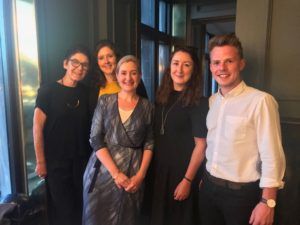 Movements with multiple leaders and multiple perspectives can be a resounding success:
Movements with multiple leaders and multiple perspectives can be a resounding success:
One of the aspects of Together for Yes that seems to have been criticised and commended in equal measure is the fact that the movement had three Directors: Ailbhe, Orla O’Connor from the National Women’s Council, and Grainne Griffin from the Abortion Rights Campaign.
In addition to having multiple leaders, the ‘Yes’ campaign brought together a wide array of national organisations, grassroots groups, political activists and private individuals – with very different backgrounds and very diverse views. Organisations that might normally be opposed to each other were suddenly working together for a common cause. This didn’t happen overnight, however: with patience over many years, understanding, strong negotiation skills and a willingness to compromise and be practical, the campaign leaders united very diverse cohorts of members to run a successful campaign.
From our own experience of working with groups like Midwives for Choice, Rebels for Yes and Scientists for Yes (the latter initiated by our own Eva), we found groups had different reasons for getting involved, but it was highly effective and persuasive to hear diverse perspectives on why the Eighth should be repealed.
Don’t pigeon-hole public figures:
In Ireland, there can sometimes be a dismissive and snobbish attitude towards ‘popular culture’ figures. If someone is (that dreaded thing!) a social media influencer or associated with beauty, comedy, fashion or sports, how could they possibly hold informed political views?
The referendum campaign threw that line of thinking on its head. Some of the most vocal and impactful campaigners were people like Tara Flynn and Andrea Horan – people whom, previously, we may have only seen featured on ‘soft’ entertainment or social media. Now, suddenly, they were popping up on current affairs programmes, news shows and in political debates. And this was no bad thing!
It’s pretty easy to spot the bandwagon-jumpers and egotists:
We probably don’t need to expand too much on this point. Suffice to say that, throughout our work on the campaign, it was always interesting to see who shoved themselves to the front during press conferences and photocalls; who grabbed the microphone for media interviews; and who ‘shouted’ the loudest on social media. In our opinion, those acting like this were, quite often, Johnny-come -latelies and / or nowhere to be seen when there was real work to be done.
People’s selflessness and generosity will surprise you:
On a much more positive note, it was overwhelming to see the selfless way in which thousands of people nationwide gave up their time, travelled long distances, shared their personal stories and pushed themselves to the limit to make the campaign a success.
For many – especially those personally impacted by the Eighth Amendment – this may have felt like a negative, judgemental and never-ending period in Irish public life. The graphic imagery on display on ‘No’ posters was distressing, the media cynicism and attempts to polarise the debate could grind you down and make you question whether all your efforts were in vain… But, instead of burying their heads in the sand or fleeing the negativity, more and more people kept turning out to support the campaign. This was ‘people power’ at its finest and most inspirational. 😊
